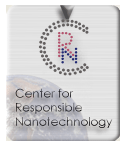PRESS RELEASE: JULY 30, 2003
CRN Offers Qualified Endorsement of Greenpeace Nanotech Report
The Center for Responsible Nanotechnology today announced its conditional
support of the Greenpeace report,
"
Future
Technologies, Today's Choices
", about the risks, benefits, and current status of nanotechnology. "We've heard
from extremists
on both sides," said Mike Treder, Executive Director of CRN.
"Now it's time for sober discussion
and serious research. This report clearly
is a step forward."
Chris Phoenix, CRN's Director of Research, agreed. "We have to accept that
some nanomaterials and
nanotechnologies may be hazardous. But we use hazardous
materials all the time, safely and beneficially.
We'll need to study and
decide case by case. We need information and common sense, not panic or
denial."
CRN has primarily focused on the benefits and dangers of molecular
nanotechnology (MNT), which promises
someday to allow flexible atomic-scale
manufacture of breakthrough products. "Many have argued, loudly
but weakly,
that MNT is impossible," said Treder. "The Greenpeace report acknowledges
difficulties, but opens the door to consideration of the possibilities."
CRN believes that serious discussion of the consequences of MNT is necessary
now. "Progress may happen
sooner than people think," said Phoenix. "Once the
engineers start working on it, the field could
take off very quickly, and its
impact could be massive."
Within the next several days, CRN will issue a supplementary commentary on the
Greenpeace report,
addressing the technical issues that were raised about MNT.
Following are specific comments on statements
made by Dr. Doug Parr,
Greenpeace Chief Scientist, in his Forward to the report:
Greenpeace (GP):
"Any technology placed in the hands of those who care
little about the possible environmental, health,
or social impacts is
potentially disastrous."
CRN: Some of those who develop the technology or make use of it will not
necessarily be driven to care
about its secondary impacts, a situation that is
understandable and acceptable. Commercial entities should
be motivated by
profit and by expansion of market share, which is the way they operate most
efficiently
and most beneficially to society at large. Scientific entities
should be motivated by curiosity and
expansion of knowledge. NGO's and
governmental bodies at least partially should be motivated by concern for
environmental, health, and social impacts -- but putting the technology only
in their hands would be
counter-productive, leading to a severe slowdown in
development (meaning reduced opportunities for
humanitarian benefits) and/or a
risky monopoly by the military. The quote above represents a simplistic
solution, which won't work. A more intelligent approach, involving the efforts
and combining the needs of
all three groups, is called for.
GP:
"Why not hold a citizens jury to determine scientific priorities on
nanotechnology?"
CRN: We support this concept, and further suggest that a citizens jury could
consider whether a
comprehensive feasibility study of advanced molecular
nanotechnology (MNT) is in order.
GP:
"There is no need for grand, new mechanisms of public involvement to
point out the blindingly
obvious."
CRN: We disagree that there is no need for new mechanisms of public
involvement. If nanotechnology,
especially MNT, has as much potential for
societal disruption as some predict, then new mechanisms will
indeed be
required. It may be premature to call for their formation at this time, but it
is not too early
to begin considering and discussing them. Nanotechnology will
have global impact, and global cooperation
currently is in short supply.
GP:
"With cause for concern, and with the precautionary principle applied,
these materials should be
considered hazardous until shown otherwise."
CRN: A sensible application of the
precautionary
principle
does not necessarily preclude the use of hazardous materials.
Some cases will be easy to decide; others
will need more study to
determine what's safe and what's risky.
|
















